Introduction
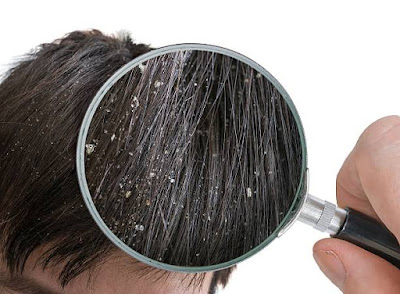 |
Ayurvedic Natural Solutions for Dandruff-Free Hair-
1. Neem (Azadirachta indica):
·
Neem possesses antibacterial and antifungal
qualities. Before washing your hair, apply neem oil or a paste prepared from neem
leaves to your scalp.
·
Leave neem leaves to soak and wash; blend with
water to make a smooth paste; strain if desired; keep in a jar and refrigerate
if not using right away; apply to skin for 15 to 20 minutes, then rinse; apply
to scalp for 30 minutes before washing.
· Although neem has a strong and distinct odor, its medicinal properties are helpful for various skin and hair issues. Should you feel any irritation, stop using it and get advice from a medical professional.
2. Amla (Indian Gooseberry):
- Amla
is rich in vitamin C and has antimicrobial properties. You can use amla
oil or mix amla powder with water to create a paste for your scalp. Indian
gooseberry, or amla, is generally helpful for daily consumption.
Here are some rules to follow:
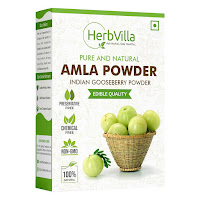 |
| Dandruff-free scalp with Herbalvilla Amla Indian Gooseberry Powder. |
·
You can keep using amla as long as you perceive
benefits if you use it to treat particular hair problems like dandruff,
hair loss, or premature graying.
·
Maintaining a well-balanced hair care regimen
that incorporates conditioning, washing, and other treatments is crucial. Amla
is an addition to this treatment but shouldn't be the sole focus.
3. Fenugreek (Methi):
Fenugreek seeds should be soaked in water overnight, ground into a paste, and applied to the scalp. With its antifungal
qualities, fenugreek aids in the reduction of dandruff.
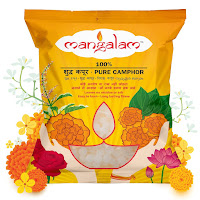 |
| Embrace the purity of MANGALAM Camphor for dandruff-free, revitalized hair, and scalp. |
4. Camphor with Coconut Oil:
Mix coconut oil with a small amount of camphor and apply it to your scalp. Camphor has antibacterial qualities, and coconut oil is nourishing. Before applying camphor to your scalp, it is ground or fully dissolved in coconut oil. A homogenous mixture is produced by grinding or dissolving, guaranteeing that the camphor is dispersed equally throughout the coconut oil. After the allotted time, often thirty minutes, wash your hair with a gentle shampoo.
5. Mask with Lemon and Curd (yogurt):
For a hair mask, blend yogurt or curd with lemon juice.
Before shampooing, apply it to your scalp and let it sit for around
thirty minutes. Curd aids with scalp hydration, and lemon has antimicrobial
qualities.
6. Powdered triphala:
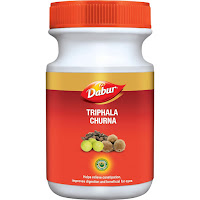 |
| Say goodbye to dandruff and embrace the goodness of Ayurveda for beautiful, nourished hair." |
Triphala, a concoction of three fruits (bibhitaki, haritaki, and amla), is renowned for its antimicrobial and antioxidant qualities. Apply a paste made of warm water on your scalp. Warm water helps the Triphala powder mix well and allows the paste to be easily applied to the skin or hair. You can use the paste on your face, scalp, or hair after it's ready. When taking Triphala internally, it is usually taken as a powder or as capsules, consumed with water or another drink.
7. Holy basil, or tulsi पवित्र तुलसी, and sesame oil:
Heat a mixture of crushed tulsi leaves and sesame oil.
Before shampooing your hair, massage this oil into your scalp. Tulsi possesses
antibacterial qualities.
8. Shampoo Made from Shikakai and Reetha (Soapnut):
To combat the dryness and give your hair more nutrients, add more ingredients to your homemade shampoo if Shikakai (Acacia concinna) and Reetha (Soapnut) are causing it to become dry. The following components are ones you might want to add-
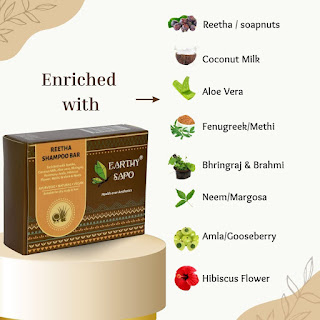 |
| "Experience the natural goodness of Earthy Sapo Handmade Reetha Shampoo Bar, crafted for dry hair. Shop Now |
*Aloe Vera Gel:
Aloe vera is well renowned for its ability to moisturize. Aloe vera gel can help hydrate your hair and calm your scalp when added to shampoo.
*Milk from coconuts:
The lipids and proteins in coconut milk help to
condition and hydrate hair. For extra hydration, incorporate coconut milk into
your shampoo combination.
*Honey:
Since honey is a naturally occurring humectant, it draws and
holds moisture. Honey can help seal in moisture and ward against dryness when
added to shampoo.
*Curd yogurt:
In addition to being a great source of protein, yogurt can
help hydrate hair. Yogurt can be added to shampoo to provide additional
conditioning benefits.
*Olive oil or argan oil:
These oils have a reputation for being hydrating. To keep
your hair nourished, mix a bit of olive or argan oil into your shampoo.
*Glycerin
A humectant that draws moisture to the hair is glycerin. A
tiny amount added to your shampoo can aid in the fight against dryness.
*Rose water:
 |
| Anveya Jojoba Oil, a cold-pressed and certified organic solution perfect for combination skin |
*Jojoba Oil:
Jojoba oil has similarities to the natural oils that the scalp produces. It can hydrate hair and assist in regulating oil production. Its non-comedogenic qualities make it the perfect option for the production of oil on the skin and preserving a nourished, healthy look.
*Extract from Marshmallow Roots:
The mucilage found in marshmallow root is well recognized
for giving hair glide and moisture. You can infuse something and include it
in your shampoo.
*Gelatin
Gelatin can give your shampoo more body and conditioning qualities. Add a bit of gelatin, dissolved in warm water, to your shampoo mixture.
Try different combinations of these components to see
what suits your hair best. Start with modest doses and modify them according to the
condition of your hair. It's also a good idea to perform a patch test
to ensure you don't have any adverse reactions.
9. Herbs from Ayurveda in Hair Oils:
Seek hair oils extracted from Ayurvedic herbs such as
amla, bhringraj, and Brahmi. Using these oils to massage your scalp can help it
stay healthy.
Conclusion-
Keep in mind that when utilizing Ayurvedic treatments,
consistency is essential. Be patient and keep up with the therapies as
prescribed; it can take some time to notice the benefits of the added
ingredients.
